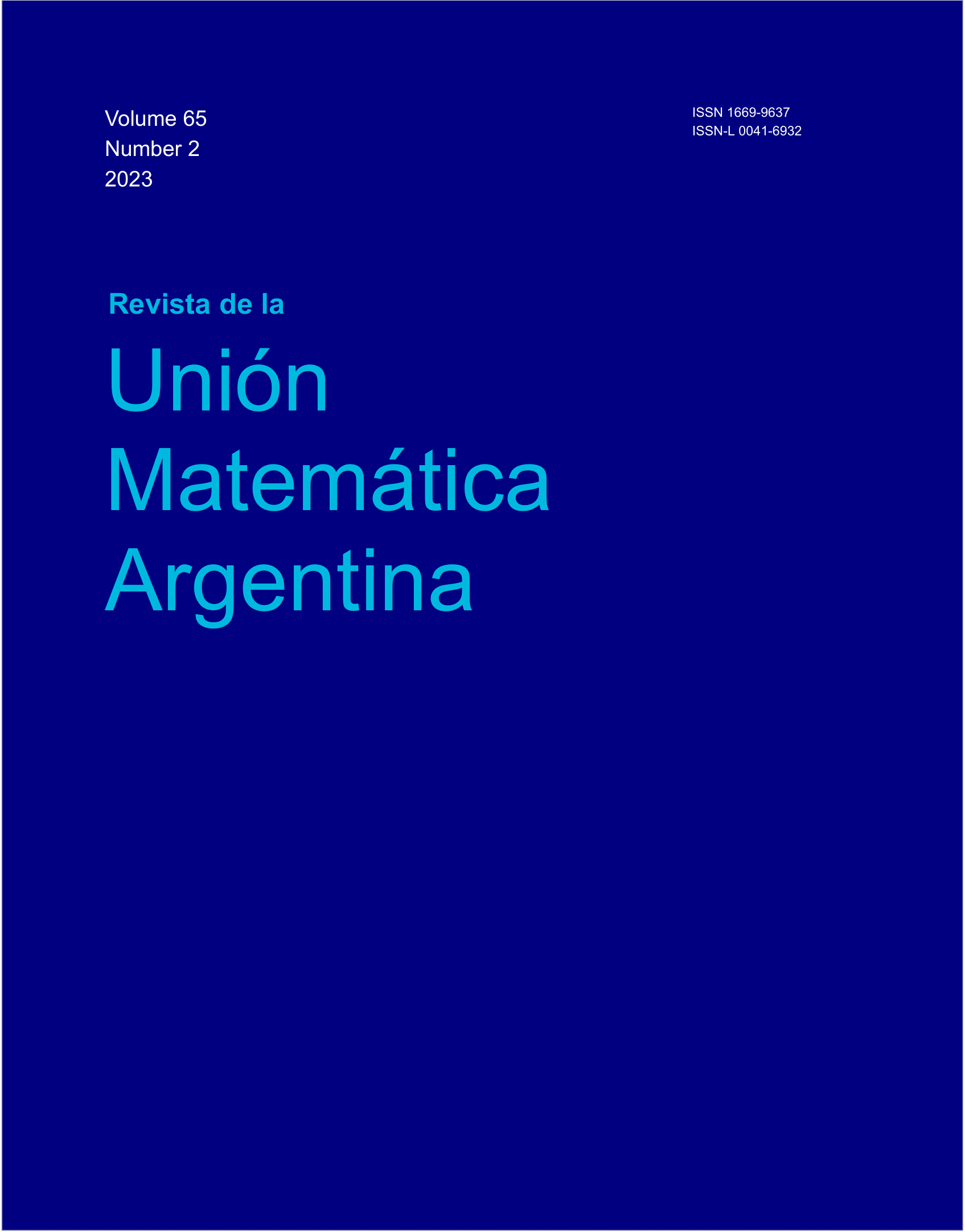Duality for infinite-dimensional braided bialgebras and their (co)modules
DOI:
https://doi.org/10.33044/revuma.2956Abstract
The paper presents a detailed description of duality for braided algebras, coalgebras, bialgebras, Hopf algebras, and their modules and comodules in the infinite setting. Assuming that the dual objects exist, it is shown how a given braiding induces compatible braidings for the dual objects, and how actions (resp., coactions) can be turned into coactions (resp., actions) of the dual coalgebra (resp., algebra), with an emphasis on braided bialgebras and their braided (co)module algebras. Examples are provided by considering these structures in a graded (or filtered) setting, where each degree is finite-dimensional.
Downloads
References
N. Andruskiewitsch, An introduction to Nichols algebras, in Quantization, Geometry and Noncommutative Structures in Mathematics and Physics, Mathematical Physics Studies, Springer, Cham, 2017, pp. 135–195. DOI MR Zbl
N. Andruskiewitsch, I. Angiono, and I. Heckenberger, On finite GK-dimensional Nichols algebras of diagonal type, in Tensor Categories and Hopf Algebras, Contemp. Math. 728, Amer. Math. Soc., Providence, RI, 2019, pp. 1–23. DOI MR Zbl
N. Andruskiewitsch, I. Angiono, and I. Heckenberger, On Nichols algebras of infinite rank with finite Gelfand-Kirillov dimension, Atti Accad. Naz. Lincei Rend. Lincei Mat. Appl. 31 no. 1 (2020), 81–101. DOI MR Zbl
N. Andruskiewitsch, I. Angiono, and I. Heckenberger, On finite GK-dimensional Nichols algebras over abelian groups, Mem. Amer. Math. Soc. 271 no. 1329 (2021). DOI MR Zbl
N. Andruskiewitsch, G. Carnovale, and G. A. García, Finite-dimensional pointed Hopf algebras over finite simple groups of Lie type I. Non-semisimple classes in PSL$_n(q)$, J. Algebra 442 (2015), 36–65. DOI MR Zbl
N. Andruskiewitsch and F. Fantino, New techniques for pointed Hopf algebras, in New Developments in Lie Theory and Geometry, Contemp. Math. 491, Amer. Math. Soc., Providence, RI, 2009, pp. 323–348. DOI MR Zbl
N. Andruskiewitsch and M. Graña, Braided Hopf algebras over non-abelian finite groups, Bol. Acad. Nac. Cienc. (Córdoba) 63 (1999), 45–78. MR Zbl
N. Andruskiewitsch, I. Heckenberger, and H.-J. Schneider, The Nichols algebra of a semisimple Yetter-Drinfeld module, Amer. J. Math. 132 no. 6 (2010), 1493–1547. DOI MR Zbl
N. Andruskiewitsch and H.-J. Schneider, Pointed Hopf algebras, in New Directions in Hopf Algebras, Math. Sci. Res. Inst. Publ. 43, Cambridge Univ. Press, Cambridge, 2002, pp. 1–68. MR Zbl Available at https://web.archive.org/web/20231206184128/https://library.slmath.org/books/Book43/files/andrus.pdf.
M. Da Rocha, J. A. Guccione, and J. J. Guccione, Braided module and comodule algebras, Galois extensions and elements of trace 1, J. Algebra 307 no. 2 (2007), 727–768. DOI MR Zbl
J. A. Guccione and J. J. Guccione, Theory of braided Hopf crossed products, J. Algebra 261 no. 1 (2003), 54–101. DOI MR Zbl
J. A. Guccione, J. J. Guccione, and C. Valqui, Universal deformation formulas and braided module algebras, J. Algebra 330 (2011), 263–297. DOI MR Zbl
X.-j. Guo and S.-c. Zhang, Integrals of braided Hopf algebras, J. Math. Res. Exposition 26 no. 4 (2006), 649–658. MR Zbl
I. Heckenberger and H.-J. Schneider, Yetter-Drinfeld modules over bosonizations of dually paired Hopf algebras, Adv. Math. 244 (2013), 354–394. DOI MR Zbl
V. K. Kharchenko, A quantum analog of the Poincaré-Birkhoff-Witt theorem, Algebra and Logic 38 no. 4 (1999), 259–276. DOI MR Zbl
V. K. Kharchenko, Quantum Lie Theory, Lecture Notes in Mathematics 2150, Springer, Cham, 2015. DOI MR Zbl
A. Klimyk and K. Schmüdgen, Quantum Groups and Their Representations, Texts and Monographs in Physics, Springer-Verlag, Berlin, 1997. DOI MR Zbl
V. V. Lyubashenko, Hopf algebras and vector symmetries, Russ. Math. Surv. 41 no. 5 (1986), 153–154. DOI MR Zbl
S. Majid, Braided groups and algebraic quantum field theories, Lett. Math. Phys. 22 no. 3 (1991), 167–175. DOI MR Zbl
S. Majid, Examples of braided groups and braided matrices, J. Math. Phys. 32 no. 12 (1991), 3246–3253. DOI MR Zbl
S. Majid, Braided groups and duals of monoidal categories, in Category Theory 1991 (Montreal, PQ, 1991), CMS Conf. Proc. 13, Amer. Math. Soc., Providence, RI, 1992, pp. 329–343. MR Zbl
S. Majid, Braided groups, J. Pure Appl. Algebra 86 no. 2 (1993), 187–221. DOI MR Zbl
S. Majid, Quantum and braided linear algebra, J. Math. Phys. 34 no. 3 (1993), 1176–1196. DOI MR Zbl
S. Majid, Algebras and Hopf algebras in braided categories, in Advances in Hopf Algebras (Chicago, IL, 1992), Lecture Notes in Pure and Appl. Math. 158, Dekker, New York, 1994, pp. 55–105. MR Zbl
S. Majid, Foundations of Quantum Group Theory, Cambridge University Press, Cambridge, 1995. DOI MR Zbl
S. Majid, Introduction to braided geometry and $q$-Minkowski space, in Quantum Groups and Their Applications in Physics (Varenna, 1994), Proc. Internat. School Phys. Enrico Fermi 127, IOS, Amsterdam, 1996, pp. 267–345. DOI MR Zbl
C. Năstăsescu and B. Torrecillas, Graded coalgebras, Tsukuba J. Math. 17 no. 2 (1993), 461–479. DOI MR Zbl
M. Rosso, Quantum groups and quantum shuffles, Invent. Math. 133 no. 2 (1998), 399–416. DOI MR Zbl
M. Takeuchi, Finite Hopf algebras in braided tensor categories, J. Pure Appl. Algebra 138 no. 1 (1999), 59–82. DOI MR Zbl
M. Takeuchi, Survey of braided Hopf algebras, in New Trends in Hopf Algebra Theory (La Falda, 1999), Contemp. Math. 267, Amer. Math. Soc., Providence, RI, 2000, pp. 301–323. MR Zbl
Y. Xu, S. Zhang, and J. Cheng, Duality theorem and Hom functor in braided tensor categories, Int. J. Mod. Math. 4 no. 2 (2009), 109–134. MR Zbl
S. Zhang and Y. Han, Duality theorems for infinite braided Hopf algebras, 2008. arXiv:math/0309007v6 [math.QA].
Downloads
Published
Issue
Section
License
Copyright (c) 2023 Elmar Wagner

This work is licensed under a Creative Commons Attribution 4.0 International License.
Authors who publish with this journal agree to the following terms:
Authors retain copyright and grant the journal right of first publication with the work simultaneously licensed under a Creative Commons Attribution License that allows others to share the work with an acknowledgment of the work's authorship and initial publication in this journal. The Journal may retract the paper after publication if clear evidence is found that the findings are unreliable as a result of misconduct or honest error.

